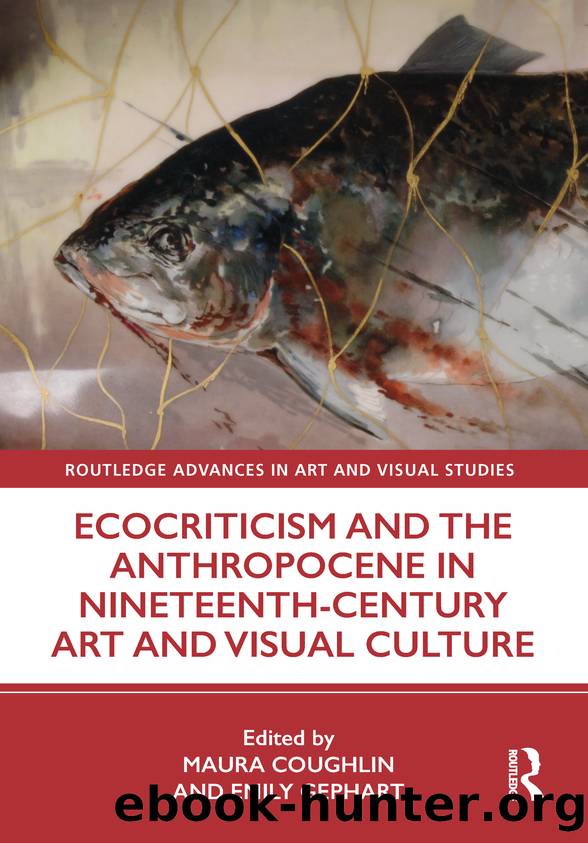Ecocriticism and the Anthropocene in Nineteenth-Century Art and Visual Culture by Maura Coughlin;Emily Gephart;

Author:Maura Coughlin;Emily Gephart;
Language: eng
Format: epub
Publisher: Taylor & Francis (CAM)
Published: 2020-07-15T00:00:00+00:00
Ruskin frequently identified the combined effects of science and self-interested economic motives in the consequence of the ravaged natural environment. It is not an accident, then, that a coin is used in his example, which is also a kind of parody of Tyndall’s experimental demonstrations. The efforts of Ruskin and Tyndall to put forward their respective points of view anticipate twenty-first-century ecocriticism. Like a diffraction pattern of pebble-provoked ripples in the water, current ecocriticism is the composite of previous waves, the first wave of nature writing in the contemplation of the Romanticized wilderness, and a second wave call to activism and environmental justice, the mixed heritages manifesting ambivalence as to the role of science, and contention as to the centrality or eccentricity of the human.
Ruskin’s point of view on the imbrication of science with commerce often moved him to direct critical comment on Tyndall’s empirical scientific observations. He writes: “the discoverers of modern science have, almost without exception, provoked new furies of avarice, and new tyrannies of individual interest” (Ruskin 1912 v26, 339). Ruskin had this attitude in common with many environmentalists and was aligned with others such as William Morris (1834–1896) and George Bernard Shaw (1856–1950) who argued for a romantic return to nature. This attitude can be traced in the tradition of conservation environmentalism resulting in the founding of The National Trust in the UK in 1895 (in which Ruskin was inspirational), as well as the London-based Coal Smoke Abatement Society in 1898. Ruskin held the men of science of Tyndall’s ilk responsible for scientific naturalism and its associated misguided debasement of nature to human intentions and purposes and to laissez-faire political economy. Yet it is exactly through Tyndall’s observations of the atmosphere that scientific arguments against the instrumentalization of nature have made progress: Tyndall’s experimental proof for the theory of greenhouse gasses has been fundamental to the development of contemporary climate science, supporting the understanding of a history of changing climate and providing evidence for the “physical basis for anthropogenic global warming” (Hulme 2009, 121). Within our current perspective, Tyndall’s work supports Ruskin’s arguments against human hubris and the associated laissez-faire economic exploitation of natural resources.
New materialism, although mobilizing a strategic anthropomorphism, moves away from the classical humanist anthropocentric view and a human-centered spiritual world, toward a planetary-centered perspective that is both ethical and integrative, in which ‘the milieu’ or environment takes center place. This new materialism is negatively critical of human hubris derived from the mistaken anthropocentric view that all nonhuman matter is more or less inert and without agency. Bennett writes that: “the image of dead of thoroughly instrumentalised matter feeds human hubris and our earth-destroying fantasies of conquest and consumption” (Bennett 2010, ix). It is this, Bennett writes, that “may be one of the impediments to the emergence of more ecological and more materially sustainable modes of production and consumption” (Bennett 2010, ix).
Here, Ruskin’s more traditional attitude to God resonates with the more spiritual strands of ecomaterialist thought. What would clearly have been contentious for Ruskin is, in new materialist thinking, the removal of a transcendental God from the equation.
Download
This site does not store any files on its server. We only index and link to content provided by other sites. Please contact the content providers to delete copyright contents if any and email us, we'll remove relevant links or contents immediately.
The Secret History by Donna Tartt(16608)
Red Sparrow by Jason Matthews(4654)
Harry Potter 02 & The Chamber Of Secrets (Illustrated) by J.K. Rowling(3289)
In a Sunburned Country by Bill Bryson(2941)
Figure Drawing for Artists by Steve Huston(2792)
The Daily Stoic by Holiday Ryan & Hanselman Stephen(2703)
Drawing Cutting Edge Anatomy by Christopher Hart(2671)
The Roots of Romanticism (Second Edition) by Berlin Isaiah Hardy Henry Gray John(2565)
Japanese Design by Patricia J. Graham(2552)
Make Comics Like the Pros by Greg Pak(2421)
Stacked Decks by The Rotenberg Collection(2266)
Harry Potter and the Deathly Hallows (7) by J.K. Rowling(2213)
On Photography by Susan Sontag(2126)
Draw-A-Saurus by James Silvani(2102)
Tattoo Art by Doralba Picerno(2079)
Foreign Devils on the Silk Road: The Search for the Lost Treasures of Central Asia by Peter Hopkirk(2053)
The Traveler's Gift by Andy Andrews(2007)
Churchill by Paul Johnson(2006)
Drawing and Painting Birds by Tim Wootton(1997)
